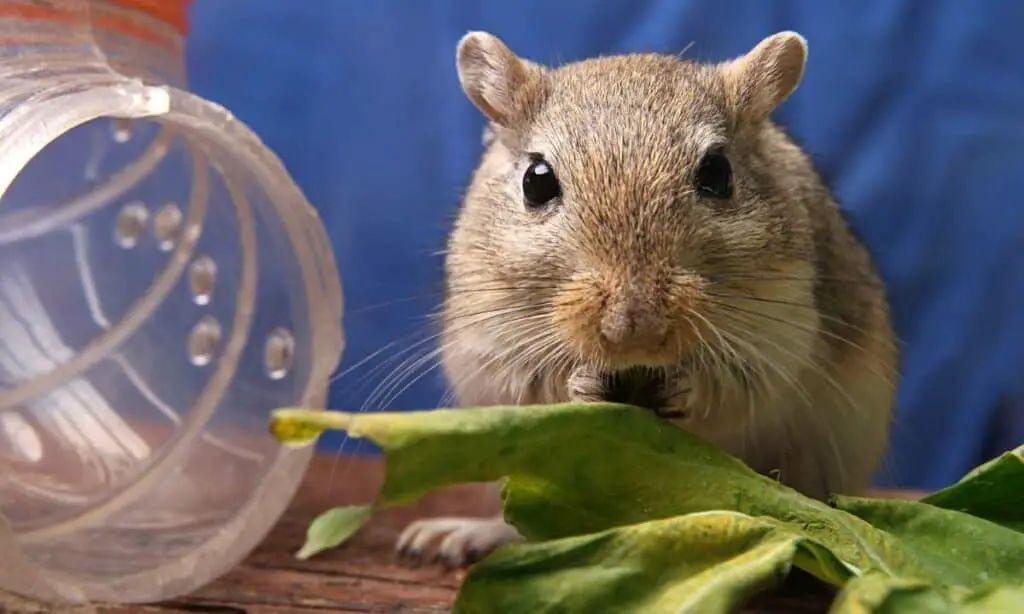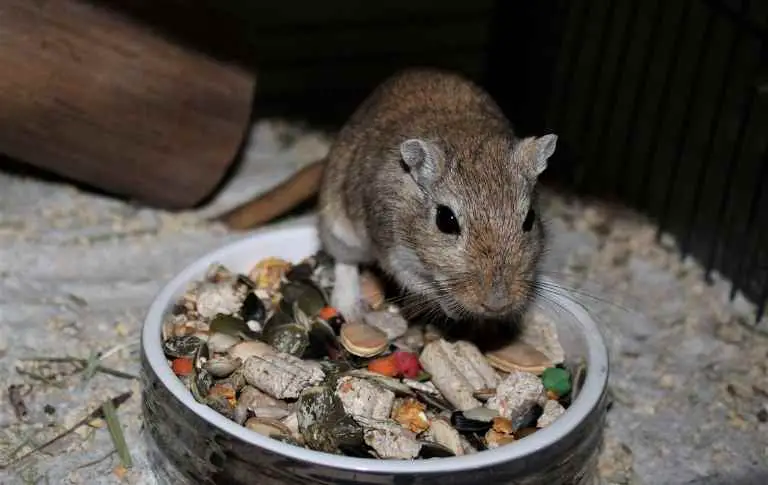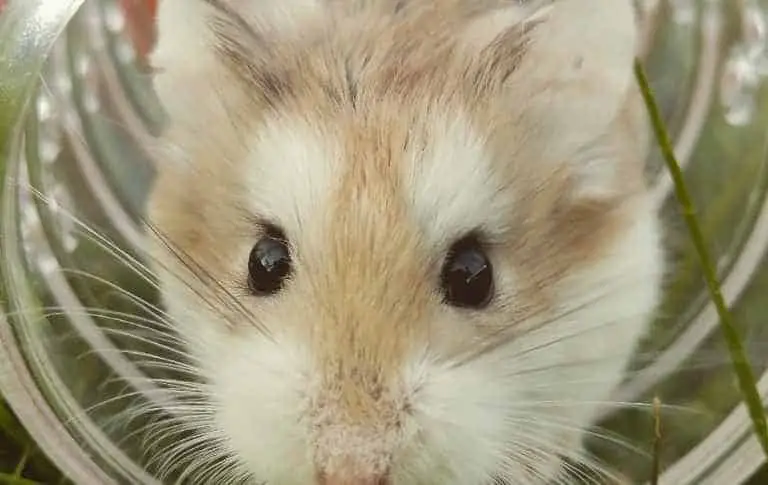Gerbils are active and intelligent little rodents that make great pets for households with kids.
Their diet should provide adequate nutrition to maintain their health, whether you opt to feed them bowl-type food or create your own custom blend using premium and natural ingredients.
In either case, the food you choose for your gerbil should focus on providing protein, carbohydrates, and fats, along with minerals and vitamins.
An important part of a balanced gerbil diet is fresh fruits and vegetables.
While they aren’t strictly necessary in every meal, they can add variety and additional nutrients to a bowl-based diet.
Certain fruits and vegetables offer more benefits than others – apples, carrots, and broccoli are often among the top picks.
In addition to fresh produce, gerbils also can benefit from other treats like sunflower seeds, nuts, or rolled oats.
These are great sources of healthy fats but should be given sparingly as treats due to their high-calorie content.
Monitor portions carefully when adding any supplement foods to avoid creating an imbalanced diet or obesity problems in your pet gerbil.
It’s important that your gerbil has enough access to hay at all times – not just for sleeping purposes but also for dietary fiber that can help keep their digestive systems functioning properly.
Marked with higher levels of vitamins A, D, and E than grasses or pasture, hay is also an important source of calcium for these animals which supports healthy teeth as well as strong bones in young animals growing into adulthood.
Table of Contents
Gerbil Diet
Knowing what to feed your gerbils is key to helping them stay healthy and happy.
They require a balanced diet full of nutritious foods that they can enjoy. The most important thing to remember when providing food for your gerbil is to provide them with variety.
Offering a variety of foods to your gerbil will help ensure they get the nutrients they need and prevent them from getting bored with their food. Let’s explore what gerbils can eat and the ideal dietary requirements for a gerbil:

Commercial Gerbil Food
Commercial gerbil food is specially blended mixtures of different ingredients that provide essential vitamins, minerals and nutrients for a balanced diet.
Many brands are available in pet stores and online, but it’s important to read ingredient labels carefully as some commercial foods are too high in protein, fat or sugar which can lead to serious health problems.
You should look for a food mixture made specifically for gerbils that has the Association of American Feed Control Officials (AAFCO) stamp of approval on the label.
This means it has met certain nutritional standards and is suitable for daily consumption by a gerbil.
Most commercial blends contain small bits of grains and seeds, dried veggies, fruits and nuts. However, avoid any blend that contains artificial colors or flavors – these ingredients can be harmful to gerbils.
You’ll also find mixes made for other animals such as hamsters, mice or rats – but don’t make the mistake of buying them for your pet gerbil.
A diet made especially for their species is best because other foods may lack the right balance of nutrients.
Some mouse or rat mixtures may include toxic substances like avocado shells or apple seeds which are dangerous to gerbils.
It’s always best to buy food specifically designed with your pet in mind!
Fruits and Vegetables
Fruits and vegetables make up an important component of a healthy diet for gerbils.
Fruits and vegetables provide essential vitamins, minerals, antioxidants, and fiber that a gerbil needs for good health.
In addition to the fresh food provided, some types of vegetables are suitable for gerbils when dried.
When providing fresh fruit and vegetables to your gerbil, only offer safe fruits and vegetables in small pieces or strips.
Feeding too much can result in diarrhea or other health problems. Fortunately, there are many types of produce suitable for gerbils that provide essential nutrients.
Fruits:
- Apples (seeds removed)
- Bananas (in moderation)
- Blueberries
- Mangoes (in moderation)
- Oranges (remove seeds)
- Pears (seeds removed)
- Raspberries
- Strawberries
Vegetables:
- Asparagus spears (cut lengthwise)
- Broccoli florets (with stalks but no stems)
- Cabbage hearts or leaves (chopped into tiny pieces/shreds)
- Carrots (cut into thin strips or small dice/cubes)
- Celery tops/leaves only (not the stems/root portion)
- Kale leaves
- Parsley sprigs
- Spinach leaves
- Sweet potatoes
- Swiss chard leaves
- Zucchini slices
For dried vegetable options such as alfalfa hay cubes and flakes with herbs contain a variety of vitamins, minerals and amino acids beneficial to your pet’s health.
Offer them in limited quantities as treats rather than staples of their diet.
Protein Sources
Gerbils are omnivores, meaning that they eat both animal proteins and plant matter.
Protein is an essential part of their diet and can be found in a variety of foods.
Here are some protein-rich food sources that are safe for gerbils to consume.
Animal Protein Sources:
- Crickets and mealworms: Insects can provide your gerbil with a healthy dose of protein; however, make sure to avoid bugs you find outside in the wild as they could be carrying diseases.
- Cooked egg: Cooked eggs can be a good source of protein for older gerbils; however, do not feed them raw eggs since these can contain salmonella bacteria which can make your gerbil sick.
- Cheese: Gerbils love cheese! Make sure to offer it in moderation and opt for the lower fat varieties such as ricotta or cottage cheese.
Plant-Based Protein Sources:
- Beans (mostly white beans): White bean sprouts are a great source of protein and fiber for gerbils, but they should only be served cooked as uncooked ones could cause digestive irritation.
- Nuts: Nuts contain high levels of healthy fats, vitamins, minerals, and proteins so try giving your gerbil-shelled walnuts or almonds every once in a while as a tasty treat. Just make sure to stay away from macadamia nuts as these can cause health issues when consumed in large quantities.
- Peas and other vegetables: Mature peas or green leafy vegetables such as cauliflower, broccoli or bok choy contain protein that is beneficial for your pet’s health; just make sure not to feed these uncooked as this could lead to indigestion problems for your pet gerbil.
Dairy Products
Gerbils are highly adaptable and can eat a variety of different foods, much like people.
Dairy products should not form a large part of their diet, as they are unable to process lactose properly.
Gerbils commercially formulated diets or grain-based treats may contain small amounts of lactose.
If you choose to offer dairy products to your gerbil, opt for low-fat natural yogurt or cheese curds rather than pasteurised processed dairy products like cow’s milk or cream.
Offer the food sparingly and keep an eye out for any adverse reactions such as bloating or diarrhea before deciding if these foods should form a regular part of their diets.
Treats
Treats are a great way to add variety to your gerbil’s diet.
You can usually find gerbil treats for sale in pet stores and online, but many safe household foods make healthy treats as well.
Generally, you should limit treats to no more than 10% of your gerbil’s total diet.
The following is a list of safe treats you can add to your gerbil’s diet:
- Dried fruits such as raisins and cranberries
- Unsalted nuts such as almonds, walnuts, or peanuts
- Whole wheat cereal or toast
- Fresh fruits and vegetables (wash them first)
- Fresh herbs like dill, parsley, or cilantro
- Uncooked oatmeal or brown rice (uncooked)
- Grains such as quinoa or wheat germ for added fiber
- Raw sunflower seeds
Always avoid sugary items like candy, chocolate and soda when looking for gerbil treats. Too much sugar in a gerbil’s diet can lead to obesity and other health problems.
Treats should be used sporadically, only given when the gerbils receive correct nutrition from their regular food sources.
Foods to Avoid
When it comes to gerbil diets, there are certain foods that should be avoided in order to keep your gerbil healthy.
Feeding your gerbil the wrong food can lead to malnourishment, obesity, and digestive issues.
In this article, we will focus on the foods to avoid in order to keep your gerbil healthy:
Sugary Foods
Gerbils are omnivores, meaning that they can eat a variety of foods.
Even though gerbils may sometimes enjoy or be tempted to eat sugary foods, these should be avoided. Sugary diets can cause health problems in gerbils such as diabetes or tooth decay.
It is important to avoid sugary snacks such as cereal, bread, pastry, cake, cookies and candy because these could lead to very serious medical problems for your gerbil.
Instead of giving your gerbil these unhealthy foods it is best to provide them with a healthy diet that consists of primarily hay and other grains with occasional treats like nuts in moderation.
Not only are sugary foods bad for a gerbil’s health but they can also lead to behavioral issues such as aggression towards other gerbils and inhabitants in their environment due to the release of adrenaline and dopamine that occurs when ingesting sugar.
If you have more than one gerbil living together it is important that they don’t share food so you can monitor which ingredients each one ingests.
It is also important to remember that even if your gerbil enjoys sugary treats on occasion this doesn’t mean they should make up the majority of its diet.
A healthy diet is key not only for your pet’s wellbeing but also for their longevity and overall happiness!
Processed Foods
Processed foods can be dangerous for gerbils, especially those that are high in fat, sugar, and salt.
These unhealthy ingredients can cause health problems and nutritional imbalances that can put your pet’s life at risk. Examples of processed foods to avoid include:
- Chips and pretzels
- Popcorn
- Crackers
- Hot dogs
- Candy
- Cookies
- Processed meats
- Cheese products
- Processed fruits and vegetables
Certain Fruits and Vegetables
Certain fruits and vegetables should be avoided when transitioning to a healthier lifestyle due to their high sugar, sodium or fat content.
Fruits and vegetables like potatoes, corn, squash, bananas, pineapples, and papayas contain higher levels of sugar than other varieties.
Processed grains such as white rice or pasta are also discouraged due to their low fiber content and further lack of nutritional value.
Vegetables that contain higher levels of sodium include beets, celery, cauliflower, or olives. Consuming too much salt on a regular basis can lead to conditions like hypertension or stroke.
Canned vegetables that come in high-sodium sauces should also be avoided because they can ultimately result in increased blood pressure and bloating.
Another food item to minimize consumption of is tropical fruits like mangoes, pomegranates, and baobab because they tend to have a larger portion size than other fruits like oranges or apples while simultaneously carrying more calories with them per serving.
It’s encouraged to choose fresh produce instead of canned goods as they will not contain any added sugars or fats like preservatives that could influence your health adversely over time.
Conclusion
In conclusion, gerbils are omnivores and have a diverse diet that can include both meat and plant-based food sources.
They enjoy a nutritious and balanced diet consisting of:
- fresh fruits
- vegetables
- commercial gerbil food mixes
- protein-rich foods like cooked eggs and chicken
- high fiber hay
- nuts and seeds
It’s important to exercise caution when providing them with a variety of treats as some human foods are toxic for the gerbils.
It is necessary to provide them with plenty of fresh clean water to stay hydrated and to give them access to plenty of small safe chew toys to help keep their teeth in good condition.




